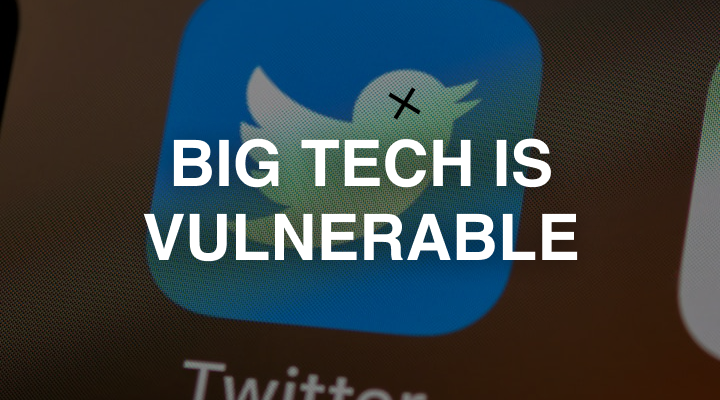In the grand scheme of tech giants, Twitter is small. Before the Elon takeover, it was estimated that they only servered ~180 million daily active users (DAUs). Compare that to the ~500 million DAUs of Instagram or the ~700 million of the newest conglomerate on the block, TikTok. Even Pinterest and Snapchat rank higher in terms of active users. However, even though it has always been the small, kid-brother of the social media oligarchy, the platform has always had an outsized impact on the world.
Twitter's micro-blogging format deeply attracted those paid to be opinionated like journalists, politicians and celebrities. And because of things like mentions and replies, people suddenly had direct lines of communication with those high above their social standing. This led to Twitter becoming a vital tool for social activism during movements like #ArabSpring, #MeToo, and #BlackLivesMatter.
But as we all know, Twitter has also been a cest pool of toxicity due to wishy-washy content moderation decisions designed to keep everyone unhappy except Wall Street investors. The same tools and tactics used to organize communities around justice have been used to promote ideas of white supremacy and authoritarianism.
It's impossible to say at this point whether Twitter has been "good" for society. What I feel I can say is that it has had an impact. And for those that created homes on Twitter, the loss of that home will be difficult, strange...and soon.
Twitter is dying.
In the last two weeks - under the expert leadership from Tony Stark cosplayer Elon Musk - the micro-blogging social media platform has gone from a humble trash fire to a flaming hot shit show.
Through a combination of mass layoffs and a moral exodus, more than half the company is gone. In order to cut costs further, the infrastructure required to maintain the site was scaled back - causing bugs, slowdowns, and outages throughout the app. On top of that, Musk's decision to comoditize verification on the platform has made impersonation as easy as paying $8/month.
These sudden issues have obviously hurt Twitter's ability to attract advertisers to the platform - causing a "massive drop in revenue" that is only accelerating the company's death spiral. And although the userbase is more active than ever, the people there know this is the beginning of the end. They are sticking around to watch the plane crash. Right now, the only reason to be on Twitter is to watch its dramatic demise.
"I'm not dead yet."
Obviously, this conversation might be premature. But at this point, I do feel Twitter's death is inevitable. There is very little Musk can do to repare the platform's reputation and right the ship that he took the helm of and immediately smashed into an iceberg.
But, like the sinking of the Titanic, the death of Twitter will be slower than expected. I think the end of Twitter will look more like Tumblr than Vine. The latter, one day, just blinked out of existence. The former lives on, but only as an obscure artifact of internet history.
What's interesting is the backdrop of this clownish end for Twitter. Across the tech industry, companies are tightening their belts and making major shifts in business strategy.
In the last month, according to Layoffs.fyi, nearly 50,000 engineers have been laid off from companies like Amazon, Meta, Lyft, Snapchat, and Salesforce. And this week, a prominent investor at Google told its leadership to "take aggressive action" in cutting down its staff.
The Wall Street Journal and other publications have reported that these layoffs are due to the optimistic overstaffing that occurred at many of these companies during the pandemic that no longer matches consumer demand in the post-pandemic era. The "I'm sorry, you're fired" letters from these CEOs all talk about rectifying unfortunate forecasting errors and preparing for a looming recession.
There is no doubt in my mind that this is true. But with most of their stock prices down between 30-60% this year, I think there's something bigger happening to Big Tech. I think these companies and their investors are finally coming to terms with the fact that...
Nothing grows forever.
Timothy Lee put out a great piece in his newsletter, Full Stack Economics, this week about the 20-year tech boom that seems to be coming to an end. In the article - which I highly recommend you read - Lee describes the economic backdrop of the tech ecosystem that led to the hyperfocus on "growth at all costs".
After the Dot-com bubble of the late 90s, investors were skeptical of any internet company's ability to actually make money. But in the 2000s, as companies like Google and Facebook started showing how lucrative programmatic advertisement could be, those investors started singing the same refrain to them that they did to Pets.com: "Here's our money. This is a gold rush. Grow fast. Dominate the market."
And although I'd say Google actually pulled it off - completely monopolizing internet search - I don't think any company took this prescription more to heart than Facebook. Mark Zuckerberg grew Facebook into the massive behmith it is today at absolutely any cost. He sacrificed the quality of the product, his reputation, and our democracy in order to keep that line moving up.
But now, the Web 2.0 gold rush is over. The market has matured. Everyone that can use these online services is (whether they want to or not). So, growth is stagnating.
Investors know this, and with the macroeconomic picture turning towards a recession, they're congratulating these companies by saying: "Great work. Now be a good public company and focus on maximizing your profits." And some, I feel, are taking this new directive a little harder than others.
Buyouts and branding.
Google seems to have no problem following their new north star. They've canceled half of the experimental projects in their R&D division and are doubling down on their newly, newly rebranded "Google Workspace" product in order to be more competitive in the enterprise tool market against Microsoft and Office365.
Twitter and their investors - by all intents and purposes - got lucky. The company had never been financially sustainable and a buyout was the best outcome for everyone involved. Note that those never involved in these decisions are the employees and the users of these platforms.
Facebook and Mark Zuckerberg seem to have taken a different approach. It seems like, upon hearing the demand from his shareholders to settle down and focus on manipulating people's attention for money, 'the Zuck' - who still owns 55% of voting rights on his company's board - said no.
Instead, he changed the company's name and is making a big bet on the VR and the 'metaverse'. His investors said, "please make more money now", and he said, "Hmm, I actually think I'm going to spend more money and make less."
Why? Who knows 🤷♂️?
If I had to speculate, he either really believes that this time VR is gonna be huge, or he's having a midlife crisis and doesn't want his life's legacy to be making a shitty website covered in ads. Either way, I'm here for it. Because one way or another, it probably means that Facebook will be the next to fall.
What's next?
Big tech is in a vulnerable state right now. Twitter is on its way out, Facebook is probably next, and I have a feeling that TikTok will soon see some serious backlash. The gold rush of Web 2.0 is over, winter has come, and now I want to know what you think is on the horizon for the internet.
Let me know by sending me an email. Also, if you'd like to get notified when my next article comes out, subscribe to my newsletter. Every Wednesday I share my latest post along with 3 additional pieces from people smarter than me.
Until next time.

